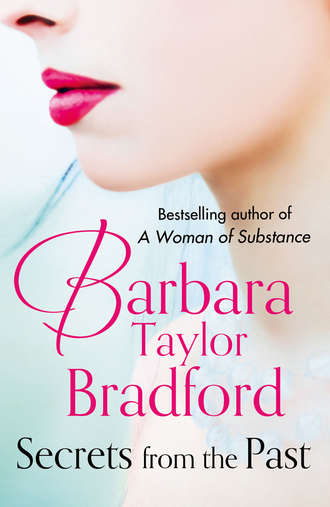
Полная версия
Secrets from the Past
I sat back in the chair, brought my hand to my mouth, reflecting on what he had just said. I knew Geoff was correct in one thing – Zac had relaxed as soon as he’d seen me, and he was talking, if only in short takes. But he wasn’t the same Zac. He was diminished and there was a fragility about him; immense sorrow was reflected in his eyes. He’d seen so much, far too much over the years, and he was drowning in pain. His behaviour was calm on the surface, but I recognized he was extremely stressed inside. Hence the bad dreams Geoff had referred to, and which hadn’t surprised me.
‘What’s worrying you, Serena?’ Geoff asked, breaking into my troubled thoughts.
I wanted to be honest with Geoff, so I told him the truth. ‘I’m pleased you’re optimistic, and that you see a change in him because I’m here. Still, I do think he’s very stressed out, on the edge, filled with anxiety.’
‘He is, but I feel easier about leaving you here alone with him.’
‘I’m comfortable being around Zac, Geoff. I’m not very big, but I can defend myself if he suddenly goes nuts.’ I realized how droll I sounded and, despite the seriousness of the matter, I couldn’t help laughing.
Geoff grinned, and shot back, ‘You could blow him over with a few puffs, he’s so weak.’
‘Not quite. But he does seem docile. I know he’s a bit grumpy, doesn’t want to bestir himself, but that’s exhaustion, isn’t it?’
‘It is, yes. As I told you, he hasn’t slept since I brought him out. Once he’s cleaned up, you might be able to get some food into him, some of your chicken-in-the-pot. And a bit of food in his belly will help him to sleep. Food and sleep, that’s what he needs right now.’
‘I’m going to start preparing my chicken-in-the-pot,’ I announced and stood up.
Geoff followed me out to the kitchen. ‘Let me show you where I dumped all the food.’
ELEVEN
When I’d brought Zac to the bolthole for the first time, we had used this bedroom; it was the one my parents had used, and my favourite. He had glanced around with interest, and made a remark about how much my parents were in love and yet slept in twin beds. He obviously thought this was strange.
There was a Stone rule: we didn’t discuss private family matters with outsiders. But I remembered now that I had been oddly embarrassed that day, had felt obliged to explain the reason to Zac. And so I confided that my mother had had a rare form of osteoporosis, which necessitated that she sleep in a single bed for her comfort.
He had been sensitive enough not to ask any further questions, and I had not volunteered any more information. I did not wish to go into personal details about my mother’s health. I felt that simple explanation was enough.
Ever since that first visit together, we had continued to use my late parents’ bedroom. In any case, the two others were also furnished with twin beds. Essentially, the bolthole was maintained for Global photographers and photojournalists, so that they could get a bit of much-needed R&R – it was not for romantic interludes.
Tonight the room was still, quiet, and nothing stirred except the flimsy white curtains flapping against the glass. I’d opened the window earlier to let in fresh air, and a breeze had blown up.
I was wide awake and listening attentively. I sensed Zac was awake as well. I was hoping he would eventually fall asleep, knowing I was here with him. Earlier this evening, I’d managed to get him to sip some of the soup and eat a bit of the chicken, although not enough to satisfy me. At least his stomach was not entirely empty.
What did please me was his cleanliness. He had showered, shampooed his hair, and thankfully it was now his natural glossy brown again, and not that strange dusty-grey colour. It was long, but that was of no concern. He had even shaved, had nicked himself with the razor, but he had made the effort. After his shower, he’d put on a pair of Harry’s pyjamas and a terrycloth robe, which Geoff had found for him.
After Geoff had gone off to the Bauer Hotel, I pottered around in the kitchen, watched my chicken bubbling, called Harry to report in, then spoke to Claudia downstairs, to say hello and thank her. After that, I unpacked my bag. For the remainder of the day, and the evening, Zac was glued to the TV, but he kept the sound low, and he seemed calm, and much less uptight.
Instinctively, I knew it was best to keep everything as normal as possible, low key, with no pressure of any kind. By allowing Zac to be himself, to do whatever he wanted, he would feel more natural and at ease.
And it worked. He had begun to speak a little, although he did not say very much, and I chatted back casually, avoided asking any questions. Harry had warned me not to probe, just to accept that he had come out of Helmand Province because he was tired, weary of being on the front line in Afghanistan.
Eventually my eyelids began to droop, but I wanted to stay awake for as long as possible, to be there for Zac. And so I began to make a mental list of things to do tomorrow.
I must call Harry twice, morning and evening; that was mandatory. He insisted on knowing what was happening with Zac, and, just as importantly, how I was coping.
I had to let Jessica know where I was, and what I was doing. That was also mandatory, another Stone rule. We must know each other’s whereabouts. Dad had drilled that into us. And I must speak to my other sister, Cara. Not only about Dad’s pictures of Mom, but the dummy of the photographic book she had recently found, one which my father had started but not finished.
Cara. My mind focused on her. She called herself the middle sister, because Jessica had been born first; she had been the second twin to pop out ten minutes later.
It had been Cara who had explained our mother’s bone condition to me, when I was old enough to understand. What Mom actually had was osteoporosis, usually considered an old woman’s disease. Our mother had a rare form of it, and this had been triggered by her pregnancy, which is when a woman’s bone density drops, and especially if she breastfeeds.
Mom was thirty-four when the twins were born, and she had breastfed them. Also, she had low peak bone mass to begin with, her doctors had told her at the time, and this hadn’t helped.
Cara had gone on to explain that when I was born, eight years later, Mom’s condition was under control, thanks to medication, although she was not permitted to breastfeed me.
I was grateful that Cara always enlightened me about tricky or complicated family matters. She usually ploughed ahead, even if she thought it was something I might not want to hear, telling me the truth. She always said it the way it was.
She was very matter of fact, pragmatic by nature, and slightly more reserved than Jess.
I loved Cara, just as I did Jess. She made me laugh a lot, and this was because of her pithy observations, often about people we knew, and her frequently caustic comments about life in general.
As a child, Cara had spent a lot of time with our grandmother, my mother’s mother, Alice Vasson. She was the only grandmother we had. Our father’s parents, David and Greta Stone, had died long before we girls were born.
Granny Alice had a repertoire of old sayings to suit almost every situation; Cara had picked them up when she was little, had kept using them ever since, and they were now part of her vocabulary. Her three favourites were: That’s going to put the cat among the pigeons; I’ll be there before you can say Jack Robinson; Waste not, want not. That last saying I often threw back at Cara, because she was no more thrifty than Jessica and I were.
It struck me that perhaps I had failed Cara, in a certain sense. I hadn’t been around enough for her after Dad died; she and Jessica had suffered as I had, had been grief-stricken as well, and I’d been nursing my wounds and my guilt in New York when I should have been with them.
Cara, in particular, was vulnerable these days because of her fiancé’s death two years ago. Jules Nollet, her French childhood sweetheart, had been killed in a skiing accident when they were on vacation in the French Alps. And that was the reason I believed Cara was frequently depressed. Jessica agreed with me. All Cara did these days was work in her orchid business. I worried about her …
I must have fallen asleep. Suddenly, I awakened with a start.
Zac was calling, ‘Serena, Serena!’
I struggled up, threw the bedclothes back and jumped out of bed, rushing over to him. ‘What is it? What’s wrong?’
‘I’m cold. Freezing,’ he muttered.
Turning on the bedside lamp, I looked down at him. His face was chalk white, his eyes red-rimmed, and he was shaking uncontrollably, huddled under the duvet.
Immediately, I pulled the duvet off my bed and laid it on top of him, then ran and closed the window. I pulled open a drawer in the chest, found two hot-water bottles, as I knew I would, and a pair of thick wool bed socks. Our mother believed in them, made all of us wear them when we were growing up, and there was a drawer-full here, bought by her years ago.
After untucking the sheets at the bottom of Zac’s bed, I managed somehow to pull the socks onto his feet, which were icy. Picking up the hot-water bottles I went to the kitchen, put on a kettle of water to boil, ran back to the bedroom. ‘Are you feeling warmer?’ I asked, bending over him in concern.
‘No,’ he mumbled, and I noticed that he was still shaking.
I was alarmed and a little frightened. Was he coming down with an illness? Or was this a manifestation of his exhaustion and lack of food? He was also stressed out and filled with anxiety, not in good shape at all. I hovered over him, uncertain about what to do to help him, other than get his body temperature back to normal.
The whistling kettle pulled me into the kitchen, and after filling the hot-water bottles I returned to the bedroom. I placed one close to his chest, the other against his back. ‘These’ll help; you’ll soon be warmer,’ I murmured.
He grunted something unintelligible.
I remained at the bedside, wondering what else would help him. Then I remembered there was nothing like another person’s body heat to warm someone who was freezing cold. I went to the other side of the bed, got in, lay close to his back, and put my arms around him. With a little manoeuvring, I managed to put my body partially on top of his, hoping my body heat would do the trick.
He continued to shiver for a while, but then very gradually the shivering became less and less. I remained on top of him, my arms holding him until he finally dozed off.
Not much time elapsed before he was breathing deeply and evenly. Finally I got out of his bed, went and turned off the lamp, praying that he would sleep through the night.
To my relief he did. When I woke up just before seven the next morning, Zac was still sleeping soundly. Slipping into my robe, I let myself out of the bedroom quietly, and went to the kitchen, where I made a pot of coffee, scrambled eggs and toast.
Carrying the tray back to the living room, I took it over to the table at the far end of the room, and began to eat.
My mind was focused on Zac and his life. I realized that he had met Harry and my father in 1999 … there was that year again. They had all been in Kosovo in September and naturally he knew who they were; was in awe of them, he told me later. Harry and Tommy took a shine to the young photographer, and he became, over time, Harry’s protégé. He was given a job at Global in 2000 and had become the star photographer over the years.
He was not a novice when it came to war, I thought now, sipping my coffee. He’d already done a lot, seen a lot of bloodshed and devastation on battle fronts all over the world by the time he’d met Dad and Harry. He was a young veteran meeting old veterans … two men who had had more than their fair share of luck when it came to survival.
Tommy and Harry had become war photographers in the early 1960s, and neither of them had ever taken a hit, nor been wounded. What luck, I thought, and I was unexpectedly rather pleased that my father had died in his own bed, and not covering a war.
If he’d had to die, at that moment in time, he had done so in the best place of all, with two of his daughters with him.
I was finishing my scrambled eggs when Zac suddenly appeared, bundled up in the terrycloth robe, looking rumpled. ‘Hi, Serena,’ he said in a slightly hoarse voice, and paused near the kitchen door. ‘I’ll get a mug of coffee.’
‘Hi,’ I answered. ‘Do you want me to make you some eggs?’
‘Not sure,’ he mumbled, and disappeared into the kitchen.
A moment later he sat down at the table opposite me with his coffee. ‘Thank you,’ he said, staring across at me, ‘for last night.’ He cleared his throat several times, then went on, ‘I don’t know what was wrong with me, but I was icy cold. I’ve never experienced anything like it before.’
‘You were freezing. I must admit I was worried. But I managed to get you warmed up.’ I studied him for a moment, noting that he did look more rested, and his face was less taut. ‘In my opinion, what you had was some kind of reaction to exhaustion and lack of nourishment. That’s why you should try and eat a little of something, Zac.’
He nodded. ‘Maybe scrambled eggs then?’ he asked hesitatingly. ‘If it’s not too much trouble.’
‘Not at all,’ I answered, rising, taking my plate and heading for the kitchen. ‘Back in a minute,’ I murmured over my shoulder.
I couldn’t help smiling wryly to myself, as I set about beating four eggs in a bowl. If it’s not too much trouble, he’d said, after asking me to come all the way from New York to take care of him.
As I returned to the living room, with his eggs and toast on a plate, I noticed that he had not turned on the television set. Silence is golden, I thought, well pleased that the room was quiet and peaceful.
He ate half the eggs and a little bread, and drank the coffee, but he didn’t say much. He still appeared somewhat remote, cut off from me. At least his body was relaxed, and he was totally calm, if uncommunicative.
I made a little conversation. I told him about Jessica’s new client, her trip to New York to see me, and mentioned that I was making progress on the book. He listened, nodded, and even smiled several times, made a few noncommittal comments.
He was not the Zac of old – the intense, passionate, talkative photojournalist with an opinion about everything and a great sense of humour. He was toned down, a little out of it, listless, I decided, preoccupied even. On the other hand, he was in control of himself, and that was the most important thing of all.
Give it time, I told myself. You’ve only been with him for a day and a night, for God’s sake. Every day he’ll improve, and he’ll soon be his old self.
How wrong I was. I had no way of knowing that morning that trouble was on its way.
TWELVE
‘Do you mean you’re not going back to Pakistan this week, or never ever going back?’ I asked Geoff, frowning as I stared at him, puzzled by his statement of a moment ago.
‘Never going back, honey. Yep, I’m outta there, and I told Harry I wanna stay out. No two ways about it, Serena, I’ve had it.’
‘I understand,’ I said, genuinely meaning this. ‘There comes a moment when enough’s enough. I felt like that last year, I knew I had to quit the front lines. I lost my nerve. I’m sure of that. And when that happens you’ve no alternative.’
Geoff nodded, was silent for a moment, sipping his iced tea, his eyes reflective as he glanced around.
We were sitting on the terrace of the Bauer Palazzo Hotel, overlooking the private dock and the Grand Canal. It was Tuesday morning and I had been in Venice for five days.
Earlier, I had taken Zac to the barber’s shop, the one that Tommy and Harry had used whenever they were in Venice, because he had decided he needed his hair cut this morning. A good sign, I thought, and I had called Geoff, suggesting we all have lunch once Zac was finished.
Geoff had been agreeable, and suggested we meet here at the old Bauer Palazzo, which was next door to the more modern Bauer Hotel, where he was staying.
As we sat here together, enjoying being outside on the sunny morning, I was feeling relaxed. Zac had been relatively normal – not his old self yet, but not manic, nor agitated in any way. Also, much to my relief, he was eating something every day. Not a lot, but he was putting some food inside himself. He slept constantly, often slipping out of the living room some afternoons and going to bed.
I remember that Dad sometimes slept like that when he came back from covering a war. Total exhaustion took over. He usually had to crash. And so did I, when I returned from a battleground.
I was thankful that Zac had not had any more disturbed nights so far. Several times he had woken up shouting, and calling my name, but these few incidents did not alarm me. I knew my presence was helping him, and I was gratified that I had come. It seemed to be paying off. I prayed it was.
Geoff turned to me, put his hand on his arm. ‘Listen, kid, I know Zac’s been relatively quiet since you got here last Thursday.’ He nodded to himself, then said slowly, ‘I wonder if that strange attack, when he was so icy cold, frightened him? Perhaps it made him focus on his health, kinda brought him up short.’
‘Maybe you’re right,’ I answered. ‘He’s never really talked about it with me. I explained that I thought it was a reaction to fatigue, lack of sleep and food, and he agreed. He’s doing okay, Geoff. I know that.’
‘I trust your judgement, Serena, and I’m glad he’s not drinking or glued to the TV set. Booze, and war reportage seen second-hand, tend to agitate him no end.’ Geoff gave me a penetrating look. ‘Do you think he’s got post-traumatic stress disorder?’
This comment took me aback. ‘I haven’t seen any real signs of it yet,’ I replied.
Geoff nodded, and took a sip of his iced tea. ‘I witnessed a few strange things when I brought him out of Afghanistan … the pacing around, the sleepless nights, the agitation, the awful fucking nightmares, and the boozing. There were times when he really did attempt to drown his sorrows. And by the way, Harry has wondered about his condition.’
‘I know, I’ve discussed it with Harry, and he said I should humour Zac, that I must allow him to rant and rave, to weep, and to get his rage out. As you and I well know, when we come out we all have pent-up emotions: anxiety, anger, frustration, despair. Being witness to too much killing, too much death, doesn’t help.’
There was a silence, and Geoff looked off into the distance again, and then he drew closer, leaned forward. ‘Listen, I am developing really bad feelings, and I’m very aware, after a few days living a normal life here, that I do have to jump ship. Pronto. My time is up on the battlefield.’
‘Then it’s the right moment to go,’ I said in a firm voice. ‘That’s when you lose your edge, when you start to dither, or question what you’re doing. That can be dangerous, Geoff: one mistake and you’re dead.’
‘I know. Zac mentioned that he’d been covering wars since he was twenty-one. That’s sixteen years, a helluva long time. I’ve only been at it for seven and lately I’ve felt pretty rotten most of the time. I don’t want to end up like Zac – burnt out, just a shell of what I was.’
‘I understand, and I must say I’ve certainly been one of the lucky ones,’ I responded. ‘Eight years on the front. But my father and Harry sent me out a lot. Dad made me go back to Nice for breaks; they both deemed it necessary. And anyway, my mother insisted on it.’
Geoff volunteered, ‘You’re not very damaged, Serena, in my opinion anyway. In fact, I’d say you’re pretty damned good. I’ve often wondered if your father or Harry ever suffered from PTSD. Do you know?’
‘They both did, at different times, so they’ve told me. But they coped, they got out, cooled off. My father went back to Nice very often because of Mom’s fragile health. And Dad once brought Harry out of the Balkans. So Harry told me the other day. From Bosnia. He was in a bad way. Dad and Harry took a very long break after that.’
‘They needed it, I bet.’
‘You know, Geoff, Dad and Harry had Global Images to fall back on, a business to run, when they weren’t covering wars. They both did other photography for a time. What are you going to do? I hope you’re not leaving Global, Geoff.’
‘No, I’m not. Harry said I should take a month off, longer if I needed it, to think about my future. And he definitely wants me to remain with the agency. I’m staying here in Venice for a few more days, I want to get myself really rested. Then I’m going back to California to see my daughter. As you know, Chloe lives with my ex-wife. It’s all very amicable. And I do need to touch base with them, have a big dose of normality. I want to put this monstrous world out of my mind.’ Geoff looked at his watch. ‘I wonder where Zac is?’ he murmured, turning to glance at me.
‘Oh, he’ll be here any minute,’ I answered, attempting a nonchalance I did not feel. I hoped I was right.
THIRTEEN
As Zac walked across the terrace towards our table, my throat constricted and a wave of emotion washed over me unexpectedly. He looked so young from a distance, appeared to be just like he was when we first met, long ago – eleven years now. And for a moment I was thrown back in time.
A decade dropped away, and I recalled how I had fallen in love with him during a very special summer in Nice. What an extraordinary summer it had been. Idyllic, romantic, filled with laughter and happiness.
He had been endearing, loving and thoughtful. Although he was handsome, it was his charm and intelligence that had captivated me. I enjoyed being with him, and we had a lot in common. In particular, we shared a love of photojournalism, especially war coverage.
Of course I had not been on the front line then, but he had, and he shared so much about his experiences with me; we very quickly bonded. He’s my soul mate, I had thought, and he had felt the same way about me. When we became serious about each other, four years later, we had both believed it was going to last forever. But that was not meant to be … we had finally parted bitterly last year.
As he drew closer, I noticed that Dad’s favourite barber, Benito, had given Zac the best haircut. It was short, stylish and youthful, and Benito, being an excellent barber, had obviously applied his skills to Zac’s face, had shaved him; Zac’s cheeks were smooth, free of stubble, and he appeared less tense.
I smiled inwardly. Zac was wearing my father’s ancient black-leather bomber jacket, which had definitely seen better days. It was years old, had become communal property, was borrowed by everyone who stayed at the bolthole. I’d even used it myself at times.
With the worn, cracked leather jacket, Zac had on an open-necked white shirt and dark trousers; the casual outfit added to his air of youthfulness.
When he finally reached our table, squeezed my shoulder, half smiled, I noticed the tightness around his eyes, the wrinkles; now that he was close up I was aware of his overall weariness. Yet he was calm, obviously wanting to behave as normally as possible. He had control of himself, that I knew.
Before I could say anything, Geoff was on his feet and hugging Zac, who returned his embrace. I noted the affection between them, the respect they had for each other. They had always been good buddies, and it was genuine loyalty and concern that had compelled Geoff to get him out of Helmand Province when he was in trouble, despite the danger and risk Geoff was exposed to in that terrible place.
Zac sat down between Geoff and me, glanced at the iced tea and said, ‘I’d like a glass of white wine, I think.’
I was silent; I felt a spurt of panic. Wine was dangerous. If he had one glass he could easily end up drinking a whole bottle. I glanced at Geoff, signalling my alarm with my eyes.







